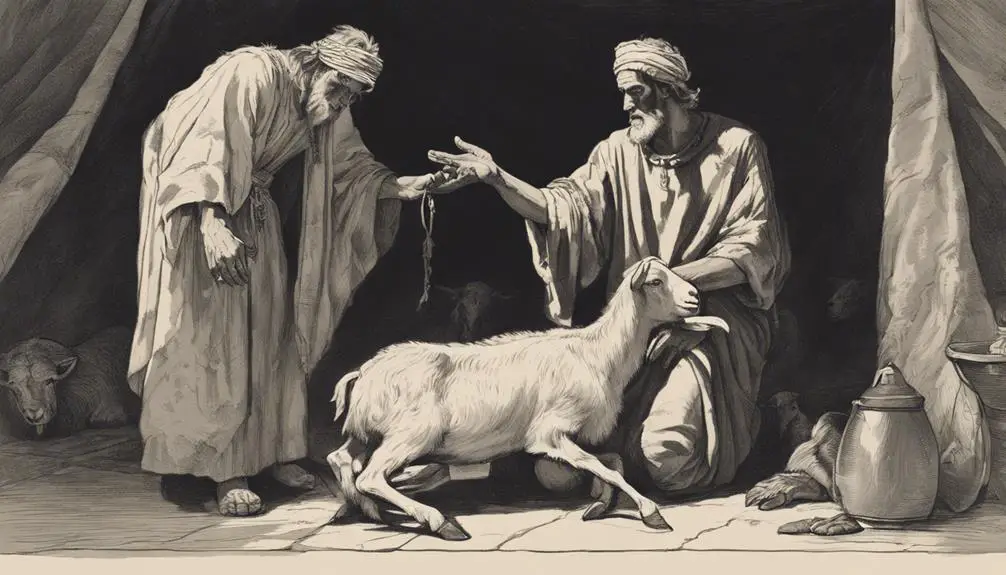Learn how biblical figures' flawed actions and attitudes mirror our own, prompting reflection and growth in our personal journeys.

Bad Attitudes in the Bible
You might not be aware, but the Bible is replete with stories of individuals exhibiting what many would consider 'bad attitudes.' From Cain's jealousy leading to the ultimate act of violence against Abel, to Jonah's outright disobedience in the face of divine instruction, these narratives offer more than just moral lessons; they provide a mirror to our own flaws and challenges.
As we explore instances like Jacob's deceit or Thomas's skepticism, you'll find these biblical figures' experiences strikingly relevant to modern dilemmas. The question then becomes, how do these ancient attitudes resonate with you, and what can they teach us about navigating our own imperfections?
Key Takeaways
- Jealousy can lead to tragic outcomes and harm relationships, as seen in Cain and Abel's story.
- Deceit erodes trust and can have long-lasting consequences, exemplified by Jacob's manipulation.
- Pride can cause downfall and distort leadership priorities, demonstrated by King Saul's actions.
- Personal insecurities and fear of failure hinder growth, highlighted through Jonah's reluctance and apprehension.
Jealousy: Cain and Abel

Jealousy often leads to destructive outcomes, as vividly illustrated in the biblical account of Cain and Abel. This story, deeply embedded within religious texts, serves as a profound exploration of sibling rivalry and its potential to escalate into tragic consequences. At the heart of their conflict were the sacrificial offerings made to God, an act that symbolized devotion and faith. Cain, a tiller of the ground, and Abel, a keeper of sheep, both presented offerings from their labor. However, God favored Abel's offering over Cain's, a preference that ignited a fierce jealousy within Cain.
This jealousy, rather than being confronted and resolved, festered into a darker intent. Cain's inability to manage his feelings led him down a path of irreversible action. The narrative captures a critical moment where sibling rivalry, fueled by envy, results in the ultimate transgression: fratricide. Cain's murder of Abel is a stark reminder of the destructive power of jealousy when left unchecked.
Analytically, this account underscores the complexities of human emotions and relationships. It serves as a cautionary tale about the dangers of allowing jealousy to cloud judgment and incite harm. The sacrificial offerings, central to the story, symbolize not only religious devotion but also the varied expressions of human effort and their reception by others. In the broader context, this narrative invites reflection on the nature of acceptance, the challenges of sibling dynamics, and the profound impact of jealousy on moral decision-making. Through the lens of Cain and Abel, we're invited to consider the profound consequences that can arise from unchecked negative emotions.
Deceit: Jacob's Trickery

While jealousy highlights the moral pitfalls of unchecked emotions, deceit, as exemplified in the narrative of Jacob's trickery, further explores the complex ethical landscape of human behavior. Jacob's manipulation to secure his brother Esau's birthright and his father Isaac's blessing, as recounted in the Bible, serves as a pivotal examination of family dynamics and the quest for inherited blessings.
The story not only underscores the nuances of sibling rivalry and parental favoritism but also delves into the repercussions of deceit within a family structure. Jacob's actions, driven by ambition and the encouragement of his mother Rebekah, illuminate the lengths to which individuals might go to achieve their desires, even at the expense of family trust and unity.
Here's a table that breaks down key components of this narrative:
Aspect |
Description |
Implications |
|---|---|---|
Character |
Jacob, the younger son |
Manipulates to gain advantage |
Action |
Deceives father and brother |
Erodes family trust |
Outcome |
Acquires birthright and blessing |
Alters family dynamics and destiny |
Lesson |
Consequences of deceit |
Reflects on ethical values and morality |
This incident in Jacob's life not only reflects the personal consequences of his deceit but also the larger, ongoing impact on his descendants, illustrating how actions motivated by selfish ambitions can have far-reaching effects on family lineage and relationships. The narrative encourages a contemplation of the ethical dimensions of deceit, challenging readers to consider the balance between personal gain and moral integrity.
Pride: King Saul's Downfall

Reflecting on the biblical narrative, King Saul's downfall is a testament to how pride can lead to one's undoing, showcasing the dangers of arrogance and self-importance in leadership. Saul's reign as the first king of Israel started with promise but quickly deteriorated due to his increasing pride and disobedience to God's commands. Saul's envy of David, who was celebrated for his victories, marked a significant turning point in Saul's leadership. This envy, fueled by Saul's pride, led him to view David as a rival rather than an asset to the kingdom.
Saul's leadership failure is further highlighted by his refusal to heed the prophetic guidance, choosing instead to rely on his own judgment. This decision-making process, tainted by pride, resulted in poor choices that not only alienated him from God but also from his people and his inner circle. Saul's inability to humble himself and acknowledge his mistakes was a clear indication of how pride had clouded his judgment.
Moreover, Saul's actions driven by envy and pride set a destructive pattern that ultimately led to his downfall. His relentless pursuit of David, motivated by jealousy rather than the welfare of his kingdom, showcased how pride can distort one's priorities and responsibilities. Saul's tragic end, losing his kingdom and his life, serves as a powerful reminder of the perils of letting pride and envy override wisdom and humility in leadership. In Saul's story, we see a clear warning against the dangers of pride leading to leadership failure, emphasizing the importance of humility and obedience in positions of authority.
Doubt: Thomas's Skepticism

Thomas's skepticism, often labeled as doubt, presents a profound exploration of faith and the necessity for personal evidence in belief systems. This biblical narrative doesn't merely highlight a moment of disbelief but rather underscores a skeptic's journey toward faith restoration. In analyzing Thomas's response to the resurrection of Jesus, one must consider the broader implications of his skepticism within the context of spiritual belief and the human condition.
You're invited to view Thomas's skepticism not as a flaw but as an integral part of his spiritual development. His insistence on tangible proof—'Unless I see the nail marks in his hands and put my finger where the nails were, and put my hand into his side, I'll not believe'—serves as a critical turning point in understanding faith's complexity. This demand for evidence and his subsequent acknowledgment of Jesus as 'My Lord and my God!' upon receiving it, highlights a pivotal moment of faith restoration.
This account offers a nuanced perspective on doubt, suggesting that skepticism can lead to a deeper, more resilient faith. Thomas's journey illustrates that faith isn't a static condition but a dynamic process that can be strengthened through questioning and personal experience. His story encourages believers to embrace their doubts, engage them critically, and seek their own evidence, understanding that this process can ultimately lead to a firmer, more profound faith.
Hence, Thomas's skepticism isn't a cautionary tale of disbelief but a narrative of spiritual exploration, demonstrating that the path through doubt can lead to a significant faith restoration.
Disobedience: Jonah's Flight

Why did Jonah choose to flee from God's command, a decision emblematic of human disobedience and its complexities within biblical narratives? Jonah's flight represents a multifaceted example of disobedience, interwoven with themes of divine intervention and personal growth. This story isn't merely about avoiding responsibility; it delves deeper into the human psyche, exploring the reasons behind our resistance to divine will.
Analyzing Jonah's flight, we uncover several key aspects:
- Fear of Failure: Jonah's apprehension about failing in his prophetic duties in Nineveh may have driven his initial disobedience.
- Perceived Injustice: Jonah struggled with the idea of God's mercy towards Nineveh, a city he viewed as unworthy of divine forgiveness.
- Personal Insecurity: His reluctance also stemmed from insecurities about his own capabilities and the significant task at hand.
- Divine Intervention: Throughout the narrative, divine intervention is a constant, guiding Jonah back to his mission, emphasizing the inevitability of divine will.
- Personal Growth: Jonah's journey is as much about the fulfillment of a divine command as it's about his personal growth, learning to trust in God's judgment and mercy.
Jonah's story, rich in its exploration of disobedience, serves as a powerful reminder of the complexities underlying our resistance to divine commands. It highlights the interplay between human frailty, divine intervention, and the potential for personal growth through obedience. As we delve into this narrative, we're invited to reflect on our own moments of resistance and the divine interventions that guide us back to our path.
Frequently Asked Questions
How Do Cultural Contexts and Historical Periods Influence the Interpretation of 'Bad Attitudes' in Biblical Narratives?
You'll find that cultural contexts and historical periods greatly influence how you interpret narratives, due to cultural relativism and the quest for historical accuracy. These aspects shape your understanding of behaviors and attitudes within any story, allowing for a more nuanced reading.
Acknowledging these factors prevents you from imposing modern values onto ancient texts, leading to a more objective and scholarly analysis of any narrative, including those with seemingly 'bad attitudes'.
Are There Examples in the Bible Where 'Bad Attitudes' Ultimately Led to Positive Outcomes or Redemption Arcs for the Characters Involved?
Yes, the Bible presents instances where negative dispositions lead to growth and redemption. Consider Jonah's journey; his initial resistance and poor attitude towards God's command eventually resulted in a deeper understanding and fulfillment of his prophetic mission.
Similarly, Saul's transformation into Paul is pivotal. Initially, his hostility towards Christians sets the stage for a dramatic turnaround, showcasing his significant contributions to spreading the gospel.
These narratives underscore the potential for personal development through adversity.
How Do Different Christian Denominations Interpret and Teach About the Consequences of 'Bad Attitudes' Showcased in the Bible?
You'll find that interpretation variance among Christian denominations shapes how they teach about biblical consequences. Each denomination brings its unique perspective to the table, fostering rich denominational dialogue.
Some may emphasize forgiveness and transformation, while others focus on the moral and spiritual lessons learned from negative behaviors. This variance enriches understanding and encourages a multifaceted approach to interpreting scriptures, allowing for a broad spectrum of teachings on consequences and personal growth.
In What Ways Does Modern Psychology Align or Conflict With Biblical Teachings on Managing Emotions Like Jealousy, Deceit, and Pride?
Modern psychology's focus on emotion regulation often aligns with biblical teachings on managing jealousy, deceit, and pride, but conflicts can arise.
For instance, cognitive dissonance may occur when your personal beliefs clash with these teachings. Psychology encourages understanding and managing emotions through therapy and self-awareness, whereas biblical texts might advocate for prayer and spiritual discipline.
Both perspectives aim to improve emotional health, but their methodologies and underlying philosophies can differ significantly.
How Have Artists, Musicians, and Writers Throughout History Been Inspired by or Depicted the Themes of Doubt and Disobedience Found in the Bible?
You'll find that artists, musicians, and writers have long been fascinated by the themes of doubt and disobedience. These narratives, rich in drama and moral complexity, have inspired countless works.
Musical adaptations often explore the emotional depth of these themes, while literary influences reflect in the nuanced portrayals of conflicted characters.
This interplay between the biblical stories and creative expression highlights how timeless and universal these themes are in human experience.
Conclusion
In conclusion, navigating through the biblical landscape reveals a tapestry of human flaws, from Cain's green-eyed monster of jealousy to Jonah's stubborn sail against divine winds. These narratives aren't just ancient texts but mirrors reflecting our own struggles with pride, deceit, doubt, and disobedience.
Analyzing these stories offers not just a scholarly examination of biblical characters but a profound understanding of the timeless battle within the human condition, urging us to confront our shadows with the light of wisdom.



Sign up